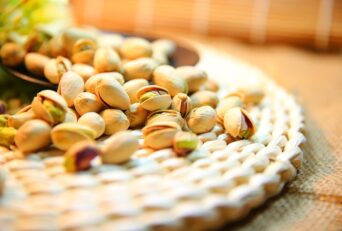Learn health benefits, uses, and properties of linseed oil in this article.
If you were looking for a versatile oil that has multipurpose applications, then your search has come to an end. Linseed Oil is here to help you.
Linseed Oil finds a range of applications, which ranges from having numerous health benefits on our body to acting as a potent preservative for wooden furniture.
Industrial grade Linseed oil finds applications in repairing old and rusted bicycles, as a wood finish, as an anti-termite agent, in oil painting, in the seasoning of cookware and conditioning of leather.
Food grade linseed oil, on the other hand, serves perfectly in providing a range of health benefits for us.
Table of Contents
What Is Linseed Oil?
Flax seeds are processed to give the Linseed Oil. This may raise a question in your mind that – If oil extracted from Flax seeds is called as Linseed Oil, then what is Flaxseed oil.
To which the answer lies in the method of processing. Flax seeds are processed in two very different ways, so as to produce Linseed Oil and Flaxseed oil, respectively.
Comparison Between Linseed Oil And Flaxseed Oil
Flax seeds are dried thoroughly, after which they are pressed to obtain Linseed Oil. Flax seeds are processed through heat treatment, such as boiling, that changes the internal structure of healthy oils.
After heat treatment, the seeds are exposed to solvents that extract each and every drop of oil from the seeds. Linseed oil that is exposed to solvents is not used for consumption, and such oil is primarily used as a wood finish and paint binder.
Flaxseed oil is extracted using cold press technique and is more natural than compared to linseed oil.
The common property of both Linseed Oil and Flaxseed Oil is their extreme susceptibility to becoming rancid. Having poor shelf lives, they must be stored away from air and sunlight.
Flax seed oil is superior to compared to the edible linseed oil, as the amount of omega three fatty acids is higher in flaxseed oil and so is the anti-inflammatory properties.
What Is The Source Of Linseed Oil?
The oil is extracted from flax seeds, which are one the oldest grown crop of the earth. Having a great commercial importance, they can be grown in areas that have cool temperatures
Flax seeds come in two varieties based on their color; they are distinguished from the yellow colored or the brown colored one. Both of these seeds are used for extracting Linseed Oil.
Nutritional Benefits Of Linseed Oil
It’s a common question that comes to our minds. The simple answer is that the oil contains various properties that promote overall health and wellness.
Food grade Linseed Oils are rich in fatty acids that are well known to promote good health. Alpha-Linolenic acid present in Linseed oil belongs to the group of Omega-3 fatty acids, which are essentially beneficial for the well-being of heart.
Antioxidant properties of the linseed oil, particularly due to the presence of lignans, are known to protect us from diseases like cancer. Linseed oil acts as a natural laxative while it also alleviates the pain and inflammation from various parts of the body.
Various other types of fatty acids that are present in the linseed oil includes Linoleic acid that has anti-inflammatory properties, Oleic Acid that reduces the cholesterol levels in the body, Stearic Acid that assists in lowering cholesterol and Palmitic acid which acts as a mild antioxidant.
Why Are Omega-3 Fatty Acids So Important?
The huge amount of Omega 3 Fatty acids present in the Food grade linseed oil raises a question that –What is so special about the Omega-3 Fatty Acids.
The reason “3” is used in Omega-3 is to refer the three types of acids that are used categorized in it. They comprise of docosahexaenoic acid (DHA), alpha-linolenic acid (ALA) and eicosapentaenoic acid (EPA).
When we consume the Omega-3 fatty acids, our body converts alpha-linolenic acid to eicosapentaenoic acid and docosahexaenoic acid, which are readily utilized by our body.
Almost every cell membrane need Omega-3 fatty acids for their proper growth and development, hence having a sufficient quantity of such acids in our body leads promotes healthy cell growth.
Health Benefits Of Linseed Oil
The list of various health benefits that linseed oil has on our body are listed below:
It lowers the level of the “bad type” of cholesterol levels in the body and protects us from heart-related diseases.
It protects against critical diseases like angina and has shown to reduce high blood pressure. The oil also prevents blood pressure to shoot up by resisting inflammatory reactions that occur in the cardiac region.
It helps in reducing inflammation related to diseases like lupus, fibrocystic breasts and gout. The Omega 3 fatty acids present in linseed oil are the one responsible for reducing the inflammation.
Having a lot of dietary fiber, linseeds are known to provide relief from constipation as it allows stools to be passed easily through the bowels. Linseed oil cleans up the intestinal pouch from any waste, thus prevents any kinds of potential infection from occurring.
Almond oil also aids in liver health and relieves constipation.
By repairing the damage done to the intestinal tract and reducing inflammation associated with it, Linseed Oil cures inflammatory bowel disease. It also prevents gallstones from occurring and can even dissolve the existing ones.
Being rich in fatty acids, Linseed Oil has amazing skin healing properties. Redness and Itchiness associated with skin eczema, rosacea and psoriasis can be healed using linseed oil. Acne’s are cured by the removal of sebum that blocks the skin pores. Also, it initiates faster recovery of sunburned are of the skin.
Camphor Essential Oil also removes skin itching and different skin ailments.
The huge amount of EFAs (Extra Fatty Acids) present in the Linseed Oil ensures healthy growth of hair and nails. Severe hair conditions like eczema or psoriasis of the scalp can respond to the application of Linseed Oil as it revitalizes the hair scalp.
Linseed oil is known to regulate nerve impulses. Nerve impulses are assisted by the EFAs in transmitting signals from one to another, thus treating physical conditions like tingling and numbness.
As the oil keeps the nervous system healthy, degenerative nerve disease like the Parkinson’s disease is kept at bay.
Lignans present in linseed oil are actively studied for their role in combating against cancer, especially related to those of colon, breast, and prostate. Though this property is heavily debated amongst scientists, many studies back the linseed oil’s role in preventing cancer.
Turmeric Essential Oil is also considered as anti-cancerous oil and can be effectively used.
Linseed oil helps in stabilizing menstrual cycle, as they balance hormone levels in women’s bodies.
Linseed oil is known to keep the sperm healthy and thus increases the fertility in men.
Safe Dosage Of Linseed Oil
One has to take care of the amount of Linseed Oil they consume at a time. There is an upper limit to the dosage of Linseed oil, and extra care has to be taken so as not to overdose on Linseed oil.
The maximum dosage of Linseed oil is 20 ML and beyond this, it can have a negative effect on the body.
How To Take Linseed Oil?
You can easily get linseed oil from the market, either in the liquid or capsule form. The oil is specially packaged so as to prevent it from getting destroyed by air, light, and heat.
Many times you have to keep the oil refrigerated. You can also use grounded linseed as explained further in the article.
Side Effects Of Linseed Oil
Even though Linseed oil has huge amounts of EFAs and Phyto-nutrients, there are few side effects associated with its consumption. They include:
Linseed oils are known to cause diarrhea and loose stools. This phenomenon is associated with higher doses of linseed oil.
Allergic reactions can manifest after consumption of linseed oil. They include hives, itching, rash, wheezing, breathing problems, swelling, etc.
Bleeding problems have been associated with consumption of linseed oil. It could manifest in the form of bleeding in the intestinal tract and brain hemorrhage.
Linseed oil has shown to interact with drugs and medicines consumed, which can have a negative effect on the body.
Toxicity Associated With Linseed Oil
When it comes to usage of linseed oil, various factors come into motion. Food grade linseed oils are safe to consume, but apart from that, you cannot use any other kind of linseed oil for no application whatsoever.
You cannot even use other kinds of linseed oil even for massaging some part of the body. Such oils may contain harmful chemicals that can be percolate through the skin and act as a harmful toxin in the body. Such chemicals tend to put the liver on an overdrive, as it finds a hard time in removing them.
If you suffer from bleeding disorders, then this oil should not be used, as it has been known to cause bleeding. It’s advisable to stop the consumption of linseed oil two weeks before the day of surgery, if you have surgery planned in forthcoming weeks.
If by any means, you sense that the oil has turned rancid, it’s strongly recommended to discard it. Consuming rancid oil can lead to cardiovascular disorder. Linseed oil is highly flammable and so must be stored in a cool atmosphere.
Precautions Related To Handling Of Linseed Oil
There are few things that must be kept in mind before using linseed oil, such as:
You should never cook anything using Linseed Oil. The healthy fats present in them convert to poisonous and toxic fat due to the application of heat. You can instead add a few drops of linseed oil after preparing a meal so that its flavor and nutrition is enhanced.
Never keep linseed oil in open, as they turn rancid when exposed to air or light. Rancid linseed oil is very unhealthy and should never be used. Always try to store linseed oil in cool and dark places that too by properly sealing it.
Before starting the consumption of Linseed Oil, you should always consult with your doctor. Whatever doses that are prescribed by your doctors should be followed ardently and you should never try to experiment with it.
Linseed Oil Or Ground Linseed?
If you compare by feasibility, then liquid linseed oil has an advantage. You can buy it in capsules or liquid form.
If you want to use ground linseeds then, you could do so by adding a couple of tablespoons of ground linseeds to a glass of water and stir it well. You can sprinkle the prepared solution on cereals, salads or vegetables; to have its nutty flavor and pleasant taste.
Grounded linseeds serve well as the whole seed passes through your body completely. When you grind the seeds just before consuming their nutritional value remains intact and is its flavor.
While using linseed oil, you can consume it with foods. Do not use it for cooking; instead, you can use it as a perfect and palatable salad dressing.
Linseed Oil With Cottage Cheese
There is a famous recipe by Dr. Johanna Budwig that uses Linseed Oil. The recipe proves to be very powerful, as it has shown to improve hemoglobin content in the blood, treating and managing cancer.
Other effects that are hinted at the use of this recipe includes: Curing tumors, alleviating anemia and revitalizing energy in the body.
All you need to do is put a few ingredients in your blender and turn it on:
- 2-5 Tbsp. of Linseed oil or flaxseed oil
- 1 cup organic cottage cheese
- 1-3 Tbsp. of freshly ground up linseed
- Sufficient water
The only thing that you have to take care of is not to add any ingredient after making the mixture.
After reading through all the health benefits and its related side effects, you must have got the clear understanding of Linseed oil. Though the oil has lots of health benefits, moderation is the key.
The key to healthy living is getting informed about various kinds of ingredients and remedies. By applying such remedies, you can live a fit and healthy life.
You have to use this oil judiciously and within the recommended doses of your doctor. Never try to increase the intake of linseed oil on your own, as it will have an adverse effect on your body.






